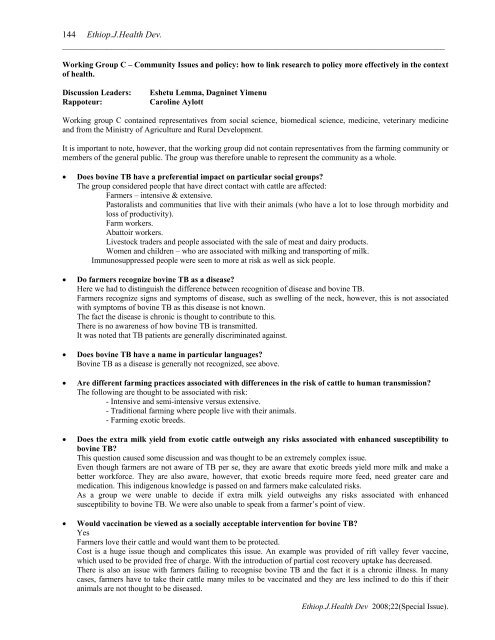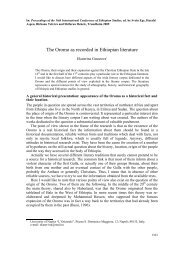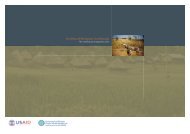You also want an ePaper? Increase the reach of your titles
YUMPU automatically turns print PDFs into web optimized ePapers that Google loves.
144 Ethiop.J.Health Dev.<br />
______________________________________________________________________________________<br />
Working Group C – Community Issues and policy: how to link research to policy more effectively in the context<br />
of health.<br />
Discussion Leaders: Eshetu Lemma, Dagninet Yimenu<br />
Rappoteur: Caroline Aylott<br />
Working group C contained representatives from social science, biomedical science, medicine, veterinary medicine<br />
and from the Ministry of Agriculture and Rural Development.<br />
It is important to note, however, that the working group did not contain representatives from the farming community or<br />
members of the general public. The group was therefore unable to represent the community as a whole.<br />
• Does bovine TB have a preferential impact on particular social groups?<br />
The group considered people that have direct contact with cattle are affected:<br />
Farmers – intensive & extensive.<br />
Pastoralists and communities that live with their animals (who have a lot to lose through morbidity and<br />
loss of productivity).<br />
Farm workers.<br />
Abattoir workers.<br />
Livestock traders and people associated with the sale of meat and dairy products.<br />
Women and children – who are associated with milking and transporting of milk.<br />
Immunosuppressed people were seen to more at risk as well as sick people.<br />
• Do farmers recognize bovine TB as a disease?<br />
Here we had to distinguish the difference between recognition of disease and bovine TB.<br />
Farmers recognize signs and symptoms of disease, such as swelling of the neck, however, this is not associated<br />
with symptoms of bovine TB as this disease is not known.<br />
The fact the disease is chronic is thought to contribute to this.<br />
There is no awareness of how bovine TB is transmitted.<br />
It was noted that TB patients are generally discriminated against.<br />
• Does bovine TB have a name in particular languages?<br />
<strong>Bovine</strong> TB as a disease is generally not recognized, see above.<br />
• Are different farming practices associated with differences in the risk of cattle to human transmission?<br />
The following are thought to be associated with risk:<br />
- Intensive and semi-intensive versus extensive.<br />
- Traditional farming where people live with their animals.<br />
- Farming exotic breeds.<br />
• Does the extra milk yield from exotic cattle outweigh any risks associated with enhanced susceptibility to<br />
bovine TB?<br />
This question caused some discussion and was thought to be an extremely complex issue.<br />
Even though farmers are not aware of TB per se, they are aware that exotic breeds yield more milk and make a<br />
better workforce. They are also aware, however, that exotic breeds require more feed, need greater care and<br />
medication. This indigenous knowledge is passed on and farmers make calculated risks.<br />
As a group we were unable to decide if extra milk yield outweighs any risks associated with enhanced<br />
susceptibility to bovine TB. We were also unable to speak from a farmer’s point of view.<br />
• Would vaccination be viewed as a socially acceptable intervention for bovine TB?<br />
Yes<br />
Farmers love their cattle and would want them to be protected.<br />
Cost is a huge issue though and complicates this issue. An example was provided of rift valley fever vaccine,<br />
which used to be provided free of charge. With the introduction of partial cost recovery uptake has decreased.<br />
There is also an issue with farmers failing to recognise bovine TB and the fact it is a chronic illness. In many<br />
cases, farmers have to take their cattle many miles to be vaccinated and they are less inclined to do this if their<br />
animals are not thought to be diseased.<br />
Ethiop.J.Health Dev <strong>2008</strong>;22(Special Issue).







